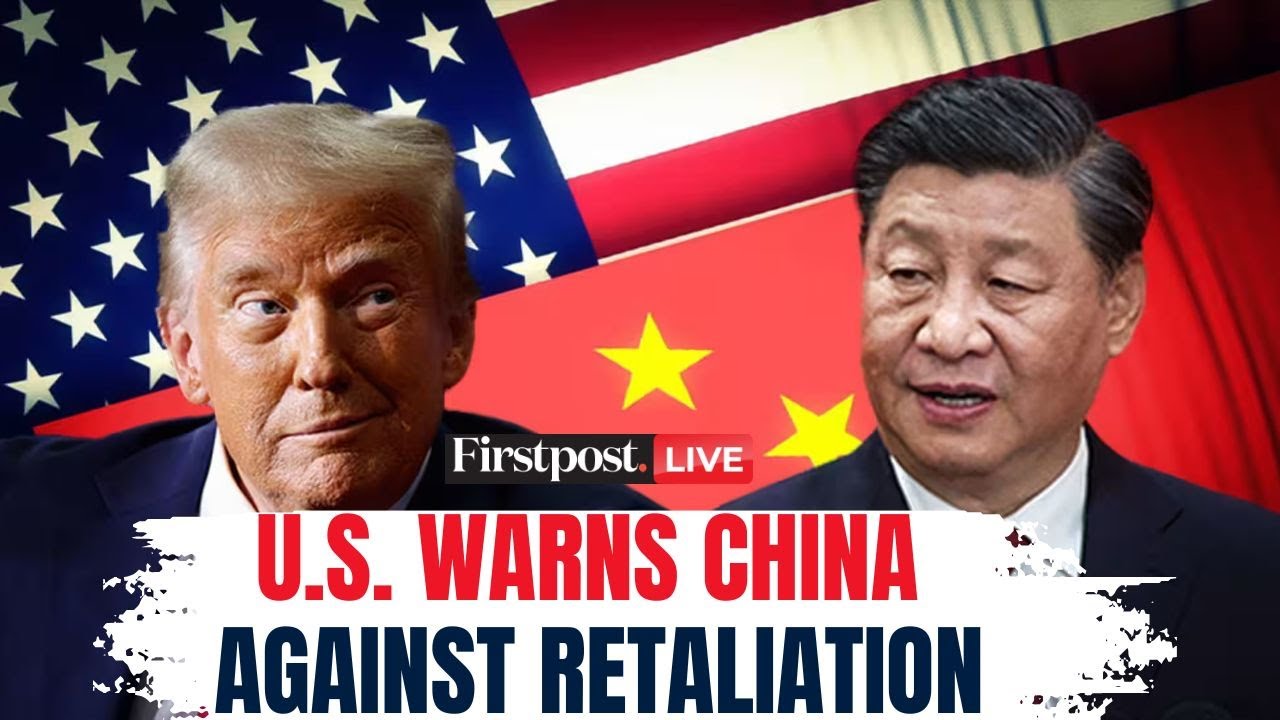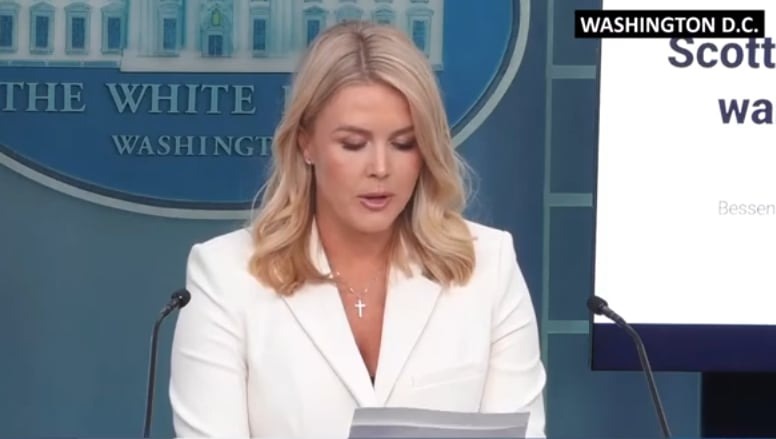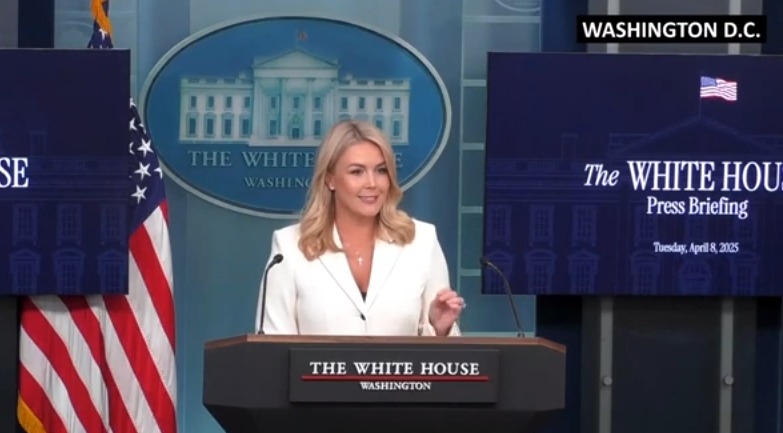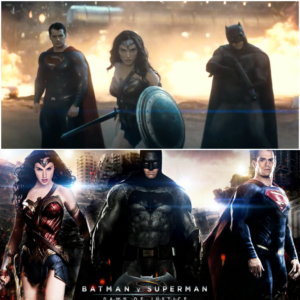
In a high-stakes escalation of his administration’s trade war, President Donald Trump unveiled a sweeping new tariff policy today, slapping 104% duties on Chinese imports effective midnight, just as a 90-day tariff pause expired. The announcement, broadcast live from the White House, thrust the U.S.-China economic rivalry back into the spotlight, with Press Secretary Karoline Leavitt issuing a stern warning to Beijing: “It would be a mistake for China to retaliate.” As markets jolted and global leaders scrambled to respond, the move underscored Trump’s unyielding “America First” stance—while raising the specter of a renewed trade conflict with far-reaching consequences.
The decision, detailed in a fiery Rose Garden address at 2:30 p.m. EDT, marked the end of a three-month tariff moratorium announced in January—a pause Trump had framed as a strategic breather for American businesses. “We gave them 90 days to figure it out, and now it’s game on,” Trump declared, his trademark bravado on full display. “China’s been ripping us off for too long—those days are over.” Flanked by Treasury Secretary Scott Bessent and trade advisors, he touted the tariffs as a shield for U.S. workers and a cudgel against Beijing’s trade practices, setting the stage for a briefing that turned combative.
Leavitt’s Warning Shot
Stepping to the podium outside the West Wing shortly after, Leavitt faced a barrage of questions from reporters eager to unpack the policy shift. The 27-year-old press secretary, a fierce loyalist from Trump’s 2024 campaign, didn’t flinch. “It was a mistake for China to retaliate last time,” she said, her voice steady and sharp. “When America is punched, President Trump punches back harder. That’s why these 104% tariffs go into effect tonight—and if China wants to talk, he’ll listen, but only on our terms.”
Her remarks referenced Beijing’s response to Trump’s first-term tariffs, which saw China impose counter-duties on U.S. goods like soybeans and automobiles—a tit-for-tat that battered American farmers and stoked inflation. This time, Leavitt framed the 104% rate as a preemptive strike, signaling zero tolerance for reprisals. “The president’s committed to doing what’s best for the American people,” she added, brushing off suggestions of economic fallout. “This isn’t about weakness—it’s about winning.”
Bessent, the data-driven Treasury chief, followed with a more tempered pitch. “We’ve watched the numbers—trade deficits, manufacturing losses, currency manipulation,” he said, citing a $375 billion goods deficit with China in 2024. “These tariffs reset the playing field.” Yet, his nod to “ongoing assessments” hinted at flexibility, a contrast to Leavitt’s hardline tone that left observers parsing the administration’s endgame.

A Policy Born of Pressure
The tariffs’ revival comes amid a turbulent economic backdrop. Inflation, hovering at 4.2% in March, has dogged Trump’s second term, fueled by supply chain snags and a robust dollar that’s squeezed exporters. The 90-day pause, announced in January, had aimed to ease those strains, giving industries time to adapt to Trump’s promised 25% blanket tariffs. But as the deadline loomed, pressure mounted. Corporate giants warned of price spikes—Walmart projected a 10% hike on electronics—while Midwest farmers braced for another Chinese backlash.
Behind closed doors, the pause had sparked debate. Bessent, a Wall Street veteran skeptical of protectionism, reportedly clashed with trade hawks like U.S. Trade Representative Robert Lighthizer, who pushed for aggressive action. Trump, ever the dealmaker, sided with the hardliners, sources say, opting for a 104% rate that dwarfs his first-term 25% duties. “He wanted a number that screams strength,” a White House aide confided. “This is it.”
Markets Reel, Allies Watch
Wall Street’s reaction was swift and jittery. The Dow plunged 600 points by midday before clawing back half its losses, closing down 280—a rollercoaster reflecting fears of inflation versus hopes of manufacturing gains. “It’s a gut punch to importers, but a lifeline for steel and tech,” said analyst Laura Henshaw of Capital Insights. Gold spiked to $2,800 an ounce as investors sought havens, while the yuan weakened 2% against the dollar.
Globally, the tariffs rippled outward. China’s Foreign Ministry fired back within hours, calling them “reckless” and vowing “necessary measures” without specifics—a stance that fueled speculation of retaliatory duties on U.S. agriculture or rare earths. The EU, caught in the crossfire, urged “restraint,” with trade chief Franz Keller noting, “Escalation helps no one.” Canada and Mexico, spared for now under USMCA, signaled relief but braced for spillover effects.
Voices from the Heartland
On American soil, the divide was palpable. In Pittsburgh, steelworker Mike Dvorak cheered the move. “China’s been dumping cheap metal for years—this levels it out,” he said, welding mask in hand. Yet in Iowa, soybean farmer Clara Ellis saw red. “Last time, China cut us off, and prices tanked,” she told this reporter, eyeing her silos. “Trump better have a plan, or we’re toast again.” The administration’s pledge of $20 billion in farm aid—echoing 2018 relief—did little to calm her nerves.
Sentiment online mirrored the split. Social media buzzed with praise for Trump’s “toughness” alongside cries of “economic suicide.” One user summed it up: “Tariffs might save jobs, but my grocery bill’s about to explode.”
A High-Stakes Bet
Analysts see the 104% rate as a calculated risk. “It’s a sledgehammer where a scalpel might’ve worked,” said trade expert Daniel Lin of Brookings. “Trump’s betting China blinks first—but if they don’t, we’re in for a rough ride.” The figure, quadruple the norm, aims to choke off Chinese imports while daring Beijing to escalate. Yet, with U.S. consumers already stretched—retail sales dipped 1.2% last quarter—the timing is precarious.

Leavitt dismissed such concerns, framing the tariffs as a long-term win. “The president’s not here to play nice—he’s here to fix decades of bad deals,” she told reporters, sidestepping questions on inflation. Bessent, meanwhile, hinted at wiggle room, noting, “We’ll monitor and adjust.” Whether that means talks or tougher measures remains unclear.
Beijing’s Next Move
China’s response will define the tariffs’ fate. Past retaliation slashed U.S. agricultural exports by $27 billion from 2018 to 2020, a wound Trump mitigated with subsidies. This time, Beijing could target tech—think Apple or Tesla—or hoard critical minerals, a move Bessent called “a real threat.” State media hinted at restraint, with one outlet musing, “Patience may outlast bravado.” But patience has limits, and Trump’s gauntlet leaves little room for de-escalation.
Allies, too, are on edge. Japan and South Korea, reliant on U.S.-China stability, urged dialogue, while NATO partners fretted over broader economic fallout. “Trump’s rolling the dice alone,” said EU diplomat Anna Berger. “We’re just hoping the table doesn’t flip.”



